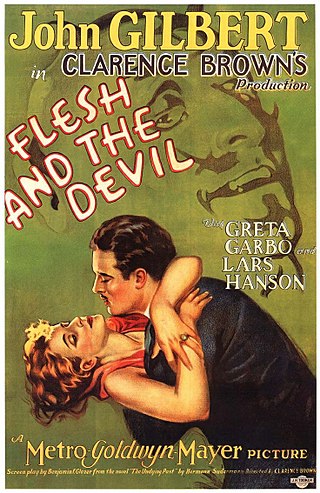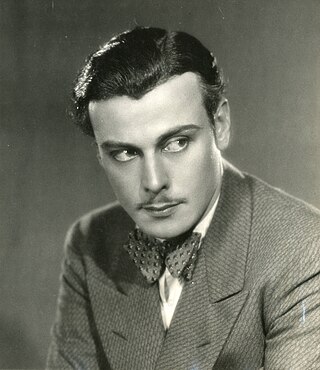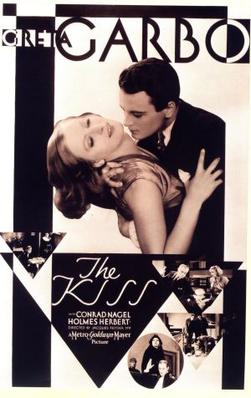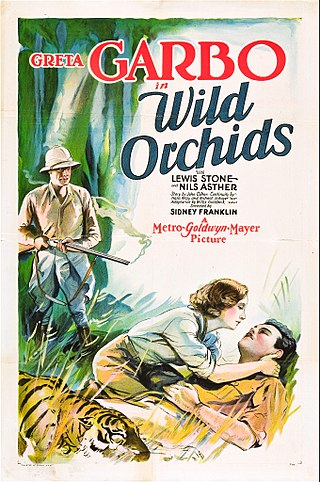This is an overview of 1929 in film, including significant events, a list of films released and notable births and deaths.

Flesh and the Devil is an American silent romantic drama film released in 1926 by Metro-Goldwyn-Mayer and stars Greta Garbo, John Gilbert, Lars Hanson, and Barbara Kent, directed by Clarence Brown, and based on the novel The Undying Past by Hermann Sudermann.

The Joan Crawford filmography lists the film appearances of American actress Joan Crawford, who starred in numerous feature films throughout a lengthy career that spanned nearly five decades.

Nils Anton Alfhild Asther was a Swedish actor active in Hollywood from 1926 to the mid-1950s, known as "the male Greta Garbo". Between 1916 and 1963 he appeared in over seventy feature films, sixteen of which were produced in the silent era. He is mainly remembered today for two silent films – The Single Standard and Wild Orchids – he made with fellow Swede Greta Garbo, and his portrayal of the title character in the controversial pre-Code Frank Capra film The Bitter Tea of General Yen.

Toshia Mori (トシア・モリ) was a Japanese-born American actress who had a brief Hollywood film career during the late 1920s and 1930s. Born as Toshiye Ichioka (市岡俊恵) in Kyoto, Mori moved to the United States when she was 10.

Anna Karenina is a 1935 Metro-Goldwyn-Mayer film adaptation of the 1877 novel Anna Karenina by Leo Tolstoy and directed by Clarence Brown. The film stars Greta Garbo, Fredric March, Basil Rathbone, and Maureen O'Sullivan. There are several other film adaptations of the novel.

Anna Christie is a 1930 Metro-Goldwyn-Mayer pre-Code film adaptation of the 1921 play of the same name by Eugene O'Neill. It was adapted by Frances Marion, produced and directed by Clarence Brown with Paul Bern and Irving Thalberg as co-producers. The cinematography was by William H. Daniels, the art direction by Cedric Gibbons and the costume design by Adrian.

Anna Christie is a 1930 German-language film adapted from the 1921 Eugene O'Neill play of the same title and filmed following the release of the English-language original version of the same adaptation earlier the same year. Both versions feature leading actress Greta Garbo. In the early years of sound films, Hollywood studios produced foreign-language versions of some of their films using the same sets and sometimes the same costumes, with native speakers of the language usually replacing some or all of the original cast. The German-language version of Anna Christie is one of the few that survives.

Love is a 1927 American silent drama film directed by Edmund Goulding and released by Metro-Goldwyn-Mayer. A sound version of the film was released in 1928 with a synchronized musical score with sound effects. MGM made the film to capitalize on its winning romantic team of Greta Garbo and John Gilbert who had starred in the 1926 blockbuster Flesh and the Devil.

Torrent is a 1926 American silent romantic drama film directed by an uncredited Monta Bell, based on a novel by Vicente Blasco Ibáñez, and released on February 21, 1926. Torrent was the first American film starring Swedish actress Greta Garbo. The film also starred Ricardo Cortez and Martha Mattox.

Dream of Love is a 1928 American synchronized sound biographical drama film directed by Fred Niblo, and starring Joan Crawford and Nils Asther. While the film has no audible dialog, it was released with a synchronized musical score with sound effects using both the sound-on-disc and sound-on-film process. The sound was recorded via the Western Electric sound system. The film is based on the 1849 French tragedy Adrienne Lecouvreur by Eugène Scribe and Ernest Legouvé.

Where East Is East is a 1929 American synchronized sound drama film starring Lon Chaney as an animal trapper in Laos. While the film has no audible dialog, it was released with a synchronized musical score with sound effects using both the sound-on-disc and sound-on-film process. The motion picture is Chaney's penultimate film without dialogue and the last of his collaborations with director Tod Browning. Metro-Goldwyn-Mayer used the Western Electric sound-on-film process to record the soundtrack for the film.

Riley the Cop is a 1928 American synchronized sound comedy film directed by John Ford. While the film has no audible dialog, it was released with a synchronized musical score with sound effects using the sound-on-film movietone process.

The Divine Woman (1928) is an American silent film directed by Victor Sjöström and starring Greta Garbo. Produced and distributed by Metro-Goldwyn-Mayer. Only a single nine-minute reel and an additional 45-second excerpt are currently known to exist of this otherwise lost film, the only complete copy of which was destroyed in the 1965 MGM vault fire.

The Mysterious Lady (1928) is a Metro-Goldwyn-Mayer silent film romantic drama, starring Greta Garbo, Conrad Nagel, and Gustav von Seyffertitz, directed by Fred Niblo, and vaguely based on the novel War in the Dark by Ludwig Wolff.

The Kiss is a 1929 American synchronized sound drama film directed by Jacques Feyder, starring Greta Garbo, Conrad Nagel, and Lew Ayres in his first feature film. The film has no audible dialogue but featured a synchronized musical score and sound effects. The soundtrack was recorded using the Western Electric Sound System sound-on-film process. The soundtrack was also transferred to discs for those theatres that were wired with sound-on-disc sound systems.

A Woman of Affairs is a 1928 Metro-Goldwyn-Mayer synchronized sound drama film directed by Clarence Brown and starring Greta Garbo, John Gilbert, Douglas Fairbanks Jr. and Lewis Stone. While the film has no audible dialog, it was released with a synchronized musical score with sound effects using both the sound-on-disc and sound-on-film process. The film was based on a 1924 best-selling novel by Michael Arlen, The Green Hat, which he adapted as a four-act stage play in 1925. The Green Hat was considered so daring in the United States that the movie did not allow any associations with it and was renamed A Woman of Affairs, with the characters also renamed to mollify the censors. In particular, the film script eliminated all references to heroin use, homosexuality and syphilis that were at the core of the tragedies involved.

Wild Orchids is a 1929 American synchronized sound drama film from Metro-Goldwyn-Mayer directed by Sidney Franklin and starring Greta Garbo, Lewis Stone and Nils Asther. Only these three stars received cast credit. While the film has no audible dialog, it was released with a synchronized musical score with sound effects using both the sound-on-disc and sound-on-film process. The plot is very similar to Garbo's later sound film, The Painted Veil (1934).

Not Quite Decent is a 1929 American sound part-talkie Pre-Code film, produced and distributed by Fox Film Corporation, directed by Irving Cummings, and starring June Collyer and Louise Dresser. In addition to sequences with audible dialogue or talking sequences, the film features a synchronized musical score and sound effects along with English intertitles. The soundtrack was recorded using the Movietone sound-on-film system.

A Man's Man is a lost 1929 synchronized sound film produced and distributed by Metro-Goldwyn-Mayer and directed by James Cruze. While the film has no audible dialog, it was released with a synchronized musical score with sound effects using both the sound-on-disc and sound-on-film process. The film starred William Haines and Josephine Dunn. It was based on a Broadway play, A Man's Man by Patrick Kearney. Greta Garbo and John Gilbert notably appear in a cameo. The film is believed to be lost, although the Vitaphone type sound discs exist and are currently held at the UCLA Film and Television Archive.


















